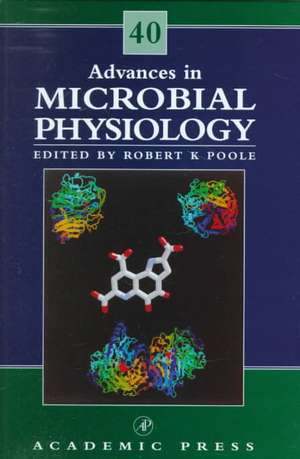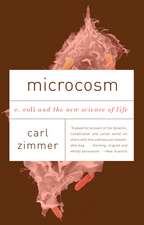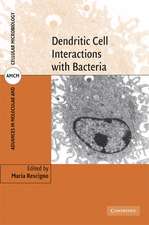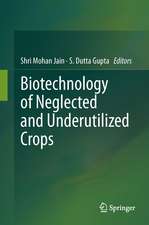Advances in Microbial Physiology: Advances in Microbial Physiology, cartea 40
Robert K. Pooleen Limba Engleză Hardback – 6 oct 1998
1. Metal ion transport in eukaryotic microorganisms: insights from Saccharomyces cerevisiae
2. Iron uptake by fungi: contrasted mechanisms with internal or external reduction
3. Dynamics of metabolism and its interactions with gene expression during sporulation in Saccharomyces cerevisiae
4. Carbon and nitrogen metabolism in rhizobium
5. Redundancy of aerobic respiratory chains in bacteria? Routes, reasons and regulations
Topics covered in this volume:
- Metal ion transport in eukaryotic microorganisms: insights from Saccharomyces cerevisiae
- Iron uptake by fungi: contrasted mechanisms with internal or external reduction
- Dynamics of metabolism and its interactions with gene expression during sporulation in Saccharomyces cerevisiae
- Carbon and nitrogen metabolism in rhizobium
- Redundancy of aerobic respiratory chains in bacteria? Routes, reasons and regulations
| Toate formatele și edițiile | Preț | Express |
|---|---|---|
| Hardback (12) | 723.70 lei 5-7 săpt. | |
| ELSEVIER SCIENCE – 22 iun 2000 | 0.00 lei Indisponibil | |
| ELSEVIER SCIENCE – 22 iun 2000 | 0.00 lei Indisponibil | |
| ELSEVIER SCIENCE – sep 1999 | 0.00 lei Indisponibil | |
| ELSEVIER SCIENCE – 16 sep 2003 | 0.00 lei Indisponibil | |
| ELSEVIER SCIENCE – 6 oct 1998 | 0.00 lei Indisponibil | |
| ELSEVIER SCIENCE – 5 oct 2016 | 723.70 lei 5-7 săpt. | |
| ELSEVIER SCIENCE – 8 mai 2020 | 726.75 lei 5-7 săpt. | |
| ELSEVIER SCIENCE – 29 iul 2017 | 728.61 lei 5-7 săpt. | |
| ELSEVIER SCIENCE – 17 iul 2015 | 731.73 lei 5-7 săpt. | |
| ELSEVIER SCIENCE – 19 oct 2019 | 731.84 lei 5-7 săpt. | |
| ELSEVIER SCIENCE – 23 mai 2019 | 735.03 lei 5-7 săpt. | |
| ELSEVIER SCIENCE – 19 apr 2013 | 981.21 lei 6-8 săpt. |
Preț: 623.04 lei
Preț vechi: 853.47 lei
-27% Nou
119.23€ • 122.11$ • 99.18£
Carte tipărită la comandă
Specificații
ISBN-10: 0120277409
Pagini: 473
Dimensiuni: 152 x 229 x 27 mm
Greutate: 0.86 kg
Editura: ELSEVIER SCIENCE
Seria Advances in Microbial Physiology
Public țintă
AUDIENCE: Microbiologists, biochemists, and biotechnologists. Researchers interested in physiology, microbial biochemistry, and its applications.Cuprins
M.H. Saier, Jr., Molecular Phylogeny as a Basis for the Classification of Transport Proteins from Bacteria, Archaea, and Eukarya.
D.J. Kelly, The Physiology and Metabolism of the Human Gastric Pathogen Helicobacter pylori.
M.J. Degado, E.J. Bedmar, and J.A. Downie, Genes Involved in the Formation and Assembly of Rhizobial Cytochromes and Their Role in Symbiotic Nitrogen Fixation.
M.P. Spector, The Starvation-Stress Response (SSR) of Salmonella.
S.C. Andrews, Iron Storage in Bacteria.
A.L. Koch, How Did Bacteria Come to Be?
T.A. Krulwich, M. Ito, R. Gilmour, D.B. Hicks, and A.A. Guffanti, Energetics of Alkaliphilic Bacillus Species: Physiology and Molecules.
Subject Index.
Recenzii
"This series has consistently presented a well-balanced account of progress in microbial physiology... Invaluable for teaching purposes." --AMERICAN SCIENTIST
Descriere
This volumeof "Advances in Microbial Physiology"continues the long tradition of topical and important reviews in microbiology Key features: Contributions from leading authorities Informs and updates on all the latest developments in the field". Professor Robert Poole is West Riding Professor of Microbiology at the University of Sheffield. He has >35 years’ experience of bacterial physiology and bioenergetics, in particular O2-, CO- and NO-reactive proteins, and has published >300 papers (h=48, 2013). He was Chairman of the Plant and Microbial Sciences Committee of the UK Biotechnology and Biological Sciences Research Council and has held numerous grants from BBSRC, the Wellcome and Leverhulme Trusts and the EC. He coordinates an international SysMO systems biology consortium. He published pioneering studies of bacterial oxidases and globins and discovered the bacterial flavohaemoglobin gene (hmp) and its function in NO detoxification He recently published the first systems analyses of responses of bacteria to novel carbon monoxide-releasing molecules (CORMs) and is a world leader in NO, CO and CORM research.

























